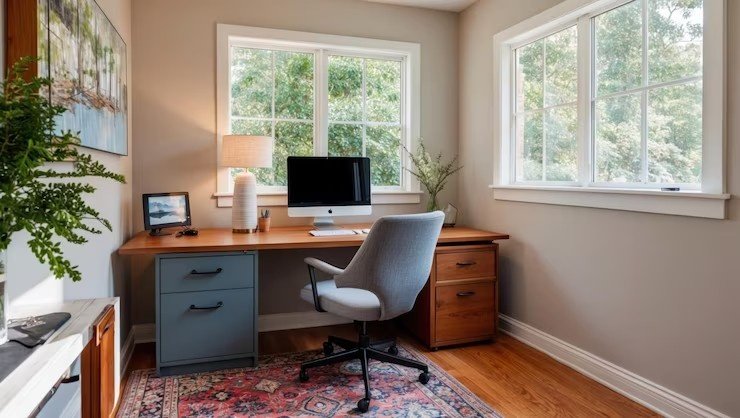As housing costs rise and urban space becomes more limited, many homeowners are exploring creative ways to make the most of their property. One increasingly popular option, as per the recent trends, is the Accessory Dwelling Unit (ADU)—a small, self-contained residential unit located on the same lot as a single-family home. Whether you’re considering scope for an extra income, more living space, independent spacing, or a solution for multi-generational housing, an ADU might be a smart move. But is it right for you?
Let’s dive into the benefits, considerations, and potential drawbacks of adding an ADU to your property before you make any decision.
What Is an ADU?
An Accessory Dwelling Unit (ADU) is a secondary living space located on the same lot as your main home. It has its own entrance, kitchen, bathroom, and living space, and is either attached to or separate from your main house. ADUs are also known as granny flats, in-law units, backyard cottages, or garage apartments. There are several types:
- Detached ADU: A standalone unit, like a backyard cottage or tiny house, separate from the main home.
- Attached ADU: Built onto the main house, such as a converted garage or an addition that shares a wall.
- Interior Conversion ADU: Created by repurposing existing space inside the home, like a finished basement or attic.
With growing support from local governments and changes in zoning laws, ADUs are becoming easier to build and rent out in many areas.

1. Generate Passive Rental Income
A key advantage of building an ADU is the potential to generate passive rental income. Renting out your ADU—whether long-term or as a short-term vacation rental—can significantly offset your mortgage, help fund retirement, or simply add a steady revenue stream.
- Long-Term Rental Income
- Stable, predictable income
- Lower turnover compared to short-term stays
- Good option in cities with housing shortages
- Short Term Rental Income
- Higher nightly rates
Versatility—it can be reserved for your private use when needed.
Ideal in tourist-heavy areas (though local regulations may apply)
Example: In high-demand rental markets like Los Angeles or Portland, a well-designed ADU could earn $1,500–$3,000+ per month in rental income.
2. Creating Flexible Living Space
Being a landlord isn’t for everyone, and that’s perfectly fine. ADUs offer flexible solutions for various life stages and needs.
Guest House
Hosting out-of-town visitors becomes easier and more comfortable with a dedicated guest house. Your guests enjoy privacy, and so do you.
Home Office or Studio
With remote work here to stay, many people need a quiet, separate space to work or create. Transform your ADU into a dream workspace—whether it’s a home office, art studio, or DIY haven.
Multi-Generational Living
ADUs are ideal for families wanting to keep loved ones close while maintaining independence. Whether it’s aging parents, young adults saving for a home, or even live-in childcare, an ADU fosters togetherness without sacrificing privacy.
Aging in Place
Planning for your future? Some homeowners build an ADU to move into themselves as they age, then rent out the main home for income.
3. Increase Property Value
Adding an ADU typically boosts the overall value and marketability of your property. ADUs are often viewed as added value by buyers, offering income potential or flexible living options.
However, value increases depend on:
- Location: Urban areas with high rent demand see more ROI
- Quality of construction: A well-designed ADU adds more value than a bare-bones setup
- Permitting and legality: Unpermitted ADUs can lower property value
According to some estimates, a permitted and well-constructed ADU can increase a property’s value by 20–30% in certain markets.
4. Consider Costs and Logistics
It’s important to understand the true costs before starting an ADU project—adding a second home to your property is a major financial commitment.
Construction Costs
Detached ADU: $100,000–$300,000+
Attached or converted space: $50,000–$150,000
Tiny homes or prefab units: $50,000–$100,000+
Permitting & Zoning
Rules vary significantly by city and state
Some areas have relaxed ADU laws; others have size, height, or parking restrictions.
Always check with your local planning department
Financing Options
HELOC (Home Equity Line of Credit)
Cash-out refinance
Renovation loans
Government incentives (some cities offer grants or tax breaks)
Maintenance and Management
If renting, factor in ongoing maintenance, repairs, and possibly property management fees
Utility hookups and separate metering can increase costs but offer long-term convenience

5. Understanding Legal and Regulatory Implications
ADUs are subject to local zoning, building, and rental regulations, which must be followed throughout the project. Key points to research:
- Property zoned for an ADU
- Size limits, height restrictions, and setback requirements
- Short-term rental permissions under the city law.
- Requirement of owner-occupancy.
- Need a separate address or utility connection.
Failure to comply can lead to fines or forced removal of the structure, so professional guidance is critical.
Weigh the Lifestyle Impact
While ADUs bring many benefits, they also change how you use your property. Before you build, ask:
- Are you comfortable having renters or guests near your home?
- Will you lose yard space or privacy?
- How will noise and parking be affected?
- Are you prepared to manage a rental property?
- Also, consider long-term plans. Will an ADU suit your lifestyle 5 or 10 years from now? Or will it become an underused space?
Sustainability and Urban Planning Benefits
On a broader scale, ADUs support more sustainable and inclusive housing:
- Smart land use: ADUs increase housing options while maintaining the existing look and feel of the neighborhood.
- Lower carbon footprint: Smaller units consume fewer resources
- Affordability: ADUs offer a cost-effective way to expand rental housing availability.
- Diverse neighborhoods: They accommodate different life stages and income levels
Many cities are promoting ADUs to help meet housing demand and combat the affordability crisis.

Final Thoughts
An ADU can be a powerful tool for financial growth, housing flexibility, and future planning. But it’s not a one-size-fits-all solution.
You’re a good candidate if:
- Your property has both the space and the necessary zoning for an ADU.
- You’re looking to generate rental income
- You want a convenient, adaptable space for hosting family or guests.
- You can manage the upfront costs and ongoing responsibilities.
You may want to reconsider if:
- Local laws make it difficult to build
- You’re uncomfortable sharing your property
- You’re not ready to take on construction or landlord duties
Before making a decision, consult local experts—architects, contractors, and city planners—who can walk you through the process and help you assess feasibility.
In the end, an ADU is more than just extra space. It’s a strategic investment in your property, your lifestyle, and even your community.
Interested in building an ADU?
Start by checking your local zoning laws, then connect with professionals like Danz Constructions who specialize in ADU design and permitting. Doing some research early on can help ensure your ADU is both smart and sustainable in the long run.
Frequently Asked Questions (FAQs)
1. What is an ADU?
An ADU (Accessory Dwelling Unit) is an extra housing unit located on your property. It can be a detached structure, an extension of the main home, or a converted space like a garage. ADUs are commonly used for renting out, housing guests, or providing space for family members.
2. How much rental income can an ADU generate?
Rental income varies depending on location, size, and local demand. In high-demand urban areas, ADUs can bring in anywhere from $1,000 to $3,000+ per month. A well-designed and legally permitted ADU can be a strong long-term investment.
3. Are any permits required to build an ADU?
Yes, most municipalities require permits for building or converting ADUs. Local zoning laws and building codes determine what type of ADU is allowed, how large it can be, and where it can be built on your property. Before getting started, make sure to check with your local planning office for any.
4. Is an ADU suitable for multigenerational living?
Indeed, ADUs provide a perfect solution for accommodating aging parents, adult children, or other relatives, all while preserving their privacy and independence. They offer a balance between closeness and autonomy, making them a popular solution for multigenerational households.
5. How does an ADU affect my property value and taxes?
An ADU can increase your property’s value due to the added livable space and potential for income. However, it may also lead to higher property taxes depending on your local assessment practices. Consulting with a real estate expert or tax advisor is recommended to understand the full financial impact.

